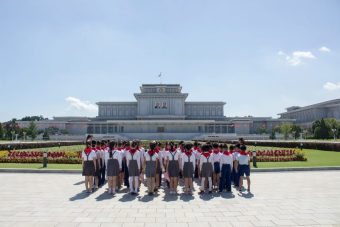
Time in North Korea seems to stand still. At least that’s how it seems to the rest of the world, which cannot come to terms with the fact that in the 21st century, a time of innovation and new social values, this totalitarian country still has the strictest rules for its citizens.
Anyone who has seen at least one documentary about this East Asian country is overwhelmed by an avalanche of emotions, from anger to sadness, because of those poor people who live there and whose hairdos even have to conform to state directives.
The mainstream media has contributed to the fact that hardly anyone would want to visit North Korea because there is almost nothing positive to read about the country. However, it all sounded too bad to be true, so I embarked on my own mini-exploration that would reveal another side of this country to me.
It all started when, quite similarly, I saw a night satellite image of North Korea. It seems that this land is pitch black at night. Again, poor people who have to read by candlelight or simply go to bed early because they have nothing to do when night falls.
However, we can look at things from a different angle – maybe North Korea is not too dark, or maybe our modern cities and metropolises are too bright.
Light pollution is a serious environmental problem that disrupts the normal functioning of natural ecosystems and adversely affects human health. Furthermore, night lighting unnecessarily consumes kilowatts and kilowatts of electricity that is mostly generated from polluting sources and thereby contributes to astronomical greenhouse gas emissions.
Modern buildings are generally overlit and yet, as it often happens, topics like preventing pollution and the climate crisis are discussed in their premises.
We can hardly alleviate the climate crisis without making some sacrifices, and that’s why I say – let’s reduce the experience with night lighting and, at least when it comes to it, be a little more like North Korea.
A country with an extremely low carbon footprint
Who would have thought that this “infamous” country has such a small carbon footprint?! North Korea has reduced its carbon dioxide emissions by 70 per cent since 1990 and has pledged to reduce emissions by around 50 per cent by 2030 if other countries help it, writes the British institute RUSI.
One of the ways for North Korea to reduce emissions of harmful gases is to invest in renewable energy sources. There is an increasing number of biomass plants and solar power plants, although there is no precise data on the number of installed green kilowatts. However, in an interview from 2021, the then-representative of the Ministry of Energy revealed that 70 per cent of the country’s electricity came from renewable sources.
Being open to cooperation in the fight against climate change
It is also surprising to see how open North Korea is to cooperating with other countries when it comes to environmental protection, so it recently established cooperation with the Swiss Agency for Development in reforestation activities, increasing food security and facilitating better access to drinking water, as well as with the Hanns Seidel Foundation in the field of sustainable forestry.
North Korea continues to cooperate with the United Nations, the European Union and South Korea when it comes to environmental protection and the fight against climate change. At the same time, this country is a signatory to the United Nations Climate Change Convention, the Vienna Convention for the Protection of the Ozone Layer, the Kyoto Protocol and the Paris Agreement.
“A War to Improve Nature”
Perhaps the only war I will ever support is Kim Jong Un’s “A War to Improve Nature”. In his 2015 speech, the undisputed North Korean leader called on “the entire party, the entire army and all the people to carry out a vigorous reforestation campaign so that the mountains become covered with forest.”
Reforestation efforts continue to date, while satellite images show that North Korea has gone green, especially in areas around Pyongyang.
Although often ridiculed in the media, Kim Jong Un recognized that taking care of nature is a prerequisite for the country’s economic development and his readiness for international cooperation and investment in renewable energy somewhat changed the stereotypical image of North Korea.
Milena Maglovski



